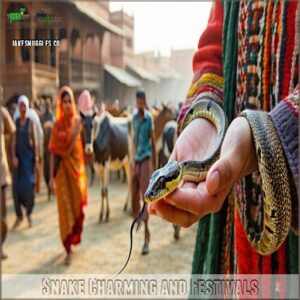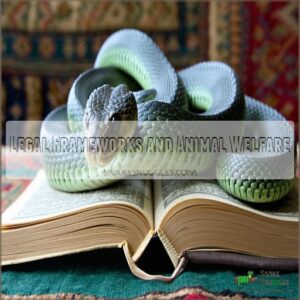This site is supported by our readers. We may earn a commission, at no cost to you, if you purchase through links.
 You may be surprised to learn that keeping pet snakes is generally considered haram (forbidden) in Islam.
You may be surprised to learn that keeping pet snakes is generally considered haram (forbidden) in Islam.
Classical scholars view snakes as impure and potentially harmful, associating them with evil forces.
However, contemporary experts take a more nuanced approach, balancing religious principles with practical considerations and compassion for all creatures.
While the symbolic link to Shaytan remains, some scholars emphasize responsible stewardship and humane treatment.
Ultimately, the permissibility of snake ownership often comes down to individual circumstances and seeking guidance from knowledgeable religious authorities.
Stay tuned to discover more insights on understanding this ethical dilemma with wisdom and care.
Table Of Contents
- Key Takeaways
- Islamic Ruling on Pet Snakes
- Are Pet Snakes Haram in Islam
- Cultural and Regional Practices
- Controversies and Debates
- Islamic Principles and Animal Welfare
- Balancing Desires and Islamic Principles
- Frequently Asked Questions (FAQs)
- Is it forbidden (Haram) to keep snakes as pets?
- Is it permissible to keep snakes as pets in Islam?
- Is it permissible to keep a snake as a pet?
- What does Islam say about snakes?
- Are Wolves Haram and dangerous animals?
- Can a hamster be a pet in Islam?
- Are snakes haram in Islam?
- Which pet is not allowed in Islam?
- Can Muslims have pet reptiles?
- Is owning a snake a sin?
- Conclusion
Key Takeaways
- While Islam generally prohibits keeping pet snakes, some scholars allow exceptions with proper care and precautions. Consult trusted religious authorities to understand the nuances.
- Responsible pet ownership that aligns with Islamic principles of compassion and stewardship is key – ensure proper enclosures, veterinary care, and meeting the snake’s needs.
- Carefully weigh the ethical considerations and potential risks before deciding if a pet snake is right for you. Personal preferences must be balanced with religious obligations.
- Rather than focusing on pet snakes, consider directing your interests and efforts towards more constructive, beneficial actions that honor your faith’s teachings on kindness and conservation.
Islamic Ruling on Pet Snakes
You may be surprised to learn that keeping snakes as pets is widely considered haram (forbidden) in Islam.
While exceptions might be made for snakes found in homes, the general prohibition is based on interpretations of Hadith that instruct Muslims to kill snakes due to their association with impurity, evil forces, and potential harm.
Scholarly Views and Interpretations
Why are scholarly views so divided on the permissibility of keeping snakes as pets in Islam?
While some Hadith instruct killing snakes, classical scholars like Ghazali emphasized compassion, while Ibn Taymiyyah focused on caution.
Notably, many Muslims today choose to care for pet snakes by shopping for snake food and supplies on reputable online stores like haram pet snake products.
Today, experts balance religious principles with practical considerations, case-by-case interpretations, and a need for respectful discourse around this ethical dilemma.
Exceptions for Snakes Found in Homes
The Islamic tradition generally discourages keeping pet snakes, but there may be exceptions for snakes found in homes.
In these cases, a grace period is often given before the snake must be removed, prioritizing safety concerns and humane treatment.
Additionally, Islamic scholars emphasize that owning snakes is considered a waste of money and resources, citing Islamic prohibitions on pet snakes.
Islamic guidance emphasizes responsible stewardship and compassion for all creatures, even potentially dangerous ones.
- Snakes found in homes may be given a grace period before removal.
- Safety and humane treatment are key concerns in Islamic teachings.
- Responsible pet ownership and compassion are emphasized.
- Seeking guidance from knowledgeable scholars is advisable for clarification.
Are Pet Snakes Haram in Islam
Keeping snakes as pets is widely considered haram (forbidden) in Islam due to their association with impurity, evil forces, and potential harm.
However, some exceptions may be made for snakes found in homes, given a grace period before removal, as religious scholars balance religious principles with practical considerations.
Why Keeping Snakes as Pets is Forbidden
Many find the idea of pet snakes unsettling.
Islamic texts often link snakes with impurity, associating them with evil spirits and potential harm.
This isn’t just about fear; the potential for a dangerous bite is real.
Additionally, feeding live prey raises ethical concerns.
These factors, rooted in Islamic texts and traditions, contribute to the view that keeping snakes as pets is haram (forbidden).
This isn’t a judgment; it’s a reflection of deeply held beliefs about snakes and purity within Islamic law on pets.
Theological Perspectives on Snakes
You’re probably curious about what Islamic teachings say about snakes.
Within the Quran, snakes are mentioned symbolically, reflecting divine power, temptation, and historical context.
Islamic scholars have shared varied insights, embracing a balance of compassion and caution.
These interpretations often point to an intricate tapestry of spiritual warnings and animal welfare, offering guidance for understanding these creatures.
Symbolic Association With Shaytan
In Islamic teachings, snakes often weave their way into discussions about Shaytan, symbolizing temptation akin to Biblical narratives.
Cultural beliefs about Shaytan highlight snakes as haram, associating them with evil.
This view stems from Islamic interpretations where Shaytan’s role in leading astray is metaphorically linked to these serpents, underscoring their negative portrayal in Islamic law.
Classical Scholars’ Views on Snakes
Classical Islamic scholars like Ghazali and Ibn Taymiyyah held diverse views on snakes, influenced by historical factors like snakebite incidents and pre-Islamic beliefs.
Ghazali emphasized compassion, while Ibn Taymiyyah advised caution, reflecting the complex symbolism of snakes in Islamic thought.
Their perspectives offer valuable insights into this nuanced debate.
Contemporary Scholars’ Views on Snakes
Contemporary scholars take a more nuanced approach regarding snakes in Islam.
While the symbolic association with Shaytan remains, some emphasize the importance of compassionate stewardship and responsible pet ownership, especially considering the challenges of snake care.
Ultimately, they encourage balancing religious principles with practical considerations to determine the permissibility of keeping snakes as pets.
- Evaluating individual circumstances and intent
- Prioritizing animal welfare and ethical treatment
- Seeking guidance from knowledgeable religious authorities
Balancing Religious Principles With Practical Considerations
While Islamic guidelines emphasize compassion for all creatures, balancing personal desires with religious principles can be tricky regarding keeping pet snakes.
Scholars acknowledge the nuances, encouraging responsible sourcing, proper care, and individual conscience.
The goal is finding humane solutions that honor both faith and our role as stewards of the natural world.
Cultural and Regional Practices
Cultural attitudes about snakes vary widely across Muslim-majority regions, ranging from reverence and fear to complete neutrality.
Snake charming festivals and legal frameworks protecting animal welfare highlight the complexity surrounding this symbolic creature in Islamic traditions.
Cultural Attitudes Towards Snakes
Exploring snakes in Islam might’ve shown they symbolically link to dualities like temptation or divine acts.
Cultural attitudes about snakes vary wildly across regions.
Some:
- Reverence as nature’s mystery
- Superstitious fears
- Neutral respect
- Utilitarian views
- Varied Islamic insights
Understand disparate cultural views to appreciate this multifaceted creature’s place in Islamic discourse.
Snake Charming and Festivals
The practice of snake charming and snake festivals have deep cultural roots in certain Muslim-majority regions.
However, these traditions face increasing scrutiny due to ethical concerns and animal welfare considerations.
Some argue these practices preserve cultural heritage, while others view them as cruel and incompatible with Islamic teachings on compassion.
Balancing cultural identity and ethical obligations remains an ongoing debate.
| Region | Practice | Perception |
|---|---|---|
| India | Snake Charming | Culturally significant, contested |
| Pakistan | Snake Festivals | Attracts tourists, scrutinized |
| Morocco | Snake Handling | Ritual roots, animal welfare issues |
| Egypt | Snake Worship | Historical significance, declining |
| Indonesia | Snake Dancing | Spiritual tradition, animal cruelty claims |
Legal Frameworks and Animal Welfare
Legal frameworks for snake ownership vary across Muslim-majority regions, reflecting differing perspectives on public safety, animal welfare, and conservation efforts.
Some areas impose strict regulations, while others maintain more lenient policies, such as the varying boa constrictor legal regulations that govern reptile ownership in different states.
Pet snake owners must navigate this complex landscape, balancing their desires with ethical responsibilities:
- Researching local laws and regulations
- Ensuring proper enclosures and veterinary care
- Supporting ethical reptile trade and sanctuary efforts
- Advocating for improved animal welfare standards
Ultimately, responsible snake ownership requires aligning personal interests with Islamic principles of compassion and stewardship.
Controversies and Debates
Differing interpretations of Islamic texts have led to ongoing debates about the permissibility of keeping snakes as pets.
While some argue against it due to the symbolic association with evil, others emphasize proper care as an act of compassion, leading to a complex and nuanced discussion.
Arguments for and Against Keeping Snakes as Pets
Keeping pet snakes sparks passionate debates within the Muslim community.
Some argue the slithery creatures symbolize dark forces, while others see them as misunderstood creatures deserving compassion.
For those who do decide to keep snakes as pets, there are online resources, such as snake pet products, that can aid in providing proper care.
Let’s explore both sides of this controversial issue:
| Arguments Against | Arguments For |
|---|---|
| Snakes represent evil | Proper care is an act of stewardship |
| No utilitarian purpose | Dispute symbolic Satan connection |
| Hadith advise killing snakes | Individual conscience plays a role |
The key is balancing personal preferences with ethical responsibilities – a delicate dance requiring thoughtful contemplation.
Ethical Considerations and Respectful Discourse
As with many ethical dilemmas, the debate surrounding keeping pet snakes in Islam requires a balanced and respectful approach.
First, consider the potential for harm – to both the snake and yourself.
Next, reflect on the Islamic principles of compassion and stewardship.
Individual Interpretation and Conscience
Your personal interpretation and conscience play a pivotal role regarding keeping pet snakes.
While some view them as forbidden, others may consider proper care an act of compassion.
Ultimately, you must weigh the ethical dilemmas and seek guidance from religious scholars to align your desires with Islamic principles.
Islamic Principles and Animal Welfare
As a devoted pet owner, you may be surprised to learn that Islamic teachings emphasize responsible stewardship and compassion for all creatures.
While the status of certain animals in Islam varies, understanding the nuanced perspectives on animal welfare can help you make informed decisions that align with your faith and ethical values.
Haram and The Status of Other Animals
In Islam, the status of animals varies – cats are generally considered clean, while dogs are often viewed differently.
The permissibility of keeping pets depends on factors like utilitarian purpose and proper care, such as those considering pet snakes and needing guidance on products related to snakes halal haram.
Haram signifies something forbidden, but determining what’s haram requires careful consideration of religious texts and principles, alongside individual conscience.
Seek guidance from scholars to navigate these nuances.
Responsible Stewardship and Compassion
Ever wonder how Islamic teachings guide us in treating animals? Responsible stewardship means embracing compassion and care, even with creatures like snakes. Islamic law encourages you to balance ethical dilemmas with humane treatment and responsible ownership. Remember, compassion isn’t just about feeding; it’s ensuring animal welfare and respecting all creations.
- Humane treatment isn’t optional.
- Compassionate care is a guiding principle.
- Responsible ownership upholds Islamic values.
Utilitarian Purposes and Proper Animal Care
Proper care and ethical considerations are paramount when keeping pet snakes.
Make sure their dietary needs are met, employ safe handling, and seek guidance from responsible breeders.
While some non-venomous snakes may be permitted, consult scholars to navigate the nuances of Islamic law and find the right balance between your desires and your faith’s principles.
Balancing Desires and Islamic Principles
Understanding the Islamic guidelines on pet ownership can be a delicate balancing act.
While personal preferences may sway you, it’s important to seek guidance from knowledgeable scholars to make sure your choices align with your faith’s principles.
Focusing on Beneficial Efforts
Rather than fixating on keeping pet snakes, consider channeling your desires into more rewarding, beneficial efforts that align with Islamic principles.
You could:
- Volunteer at an animal shelter and care for rescue animals
- Participate in community-led wildlife conservation projects
- Donate to reputable organizations that protect endangered species
These actions nurture your compassion while honoring your faith’s teachings on kindness and responsible stewardship.
Seeking Guidance From Knowledgeable Scholars
You might’ve asked yourself, “How can I navigate the murky waters of permissible pets in Islam?”
Seeking advice from knowledgeable scholars offers clarity amidst ethical dilemmas.
Balancing personal desires with religious principles demands understanding scholarly consensus and interpretations of texts.
Embrace your role of conscience—reach out to scholars to untangle whether pet snakes are truly haram animals.
Frequently Asked Questions (FAQs)
Is it forbidden (Haram) to keep snakes as pets?
A snake’s a slippery subject – while some see them as haram, the truth’s more nuanced.
Consider your conscience, consult scholars, and weigh the risks before deciding if a scaly sidekick is right for you.
Is it permissible to keep snakes as pets in Islam?
The general consensus among Islamic scholars is that keeping snakes as pets is considered haram, or forbidden, due to their association with impurity, potential harm, and lack of clear benefit.
Exceptions may exist depending on individual circumstances and guidance from knowledgeable religious authorities.
Is it permissible to keep a snake as a pet?
While Islam generally prohibits keeping snakes as pets due to their association with impurity and potential harm, some scholars allow exceptions if proper care and precautions are taken.
Consult a trusted Islamic authority to understand the nuances.
What does Islam say about snakes?
Islamic texts and scholars largely prohibit keeping snakes as pets, citing potential harm and cruelty.
Exceptions may be made for harmless, non-venomous snakes, while emphasizing responsible care and caution.
Are Wolves Haram and dangerous animals?
Wolves are generally not considered haram in Islam, but they’re considered dangerous animals. You’ll want to exercise caution and follow local laws and regulations regarding their ownership and handling.
Can a hamster be a pet in Islam?
Pardon me, my friend, but keeping a hamster as a pet is widely considered permissible in Islam.
These furry companions can make delightful, low-maintenance pets that bring joy, provided their care and housing align with Islamic principles.
Are snakes haram in Islam?
Keeping snakes as pets is widely viewed as haram (forbidden) in Islam due to their association with impurity and potential harm.
However, some scholars suggest exceptions may be made in certain circumstances.
Which pet is not allowed in Islam?
As the old saying goes, one person’s delight is another’s delight – and in the matter of pets in Islam, snakes aren’t the slithering stars.
Say goodbye to scaly companions, my friend!
Can Muslims have pet reptiles?
While certain reptiles may be permitted, keeping snakes as pets is generally discouraged in Islam due to concerns over potential harm and religious symbolism.
Consult your local scholar for guidance on responsible pet ownership that aligns with your faith.
Is owning a snake a sin?
Reptile enthusiasts, behold!
Snakes may be slippery,
but the path to righteous ownership lies in balancing faith and passion.
Tread carefully, my friend,
and consult scholars to make sure your scaly companion aligns with your spiritual journey.
Conclusion
Quite frankly, the issue of keeping pet snakes in Islam is a nuanced and contentious one.
While traditional scholars resolutely condemn the practice, modern perspectives encourage a more compassionate, balanced approach – one that respects both religious principles and the welfare of these misunderstood creatures.
Ultimately, the decision rests with each individual, guided by a sincere desire to uphold their faith and treat all life with the dignity it deserves.
The choice is yours, but tread carefully, as the are pet snakes haram debate continues to unfold.



















